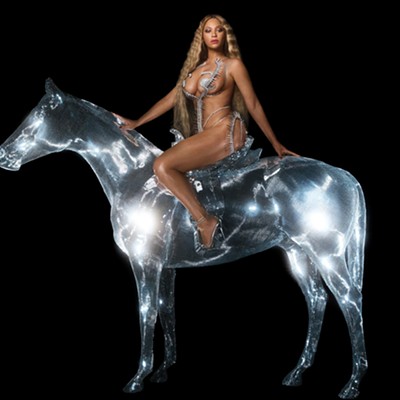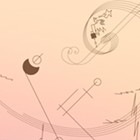The Man, the Beard, the Legend
[
{
"name": "Broadstreet - Instory",
"insertPoint": "5",
"component": "25846487",
"requiredCountToDisplay": "5"
},{
"name": "Broadstreet - Instory",
"insertPoint": "10",
"component": "25846487",
"requiredCountToDisplay": "10"
},{
"name": "Broadstreet - Instory",
"insertPoint": "15",
"component": "25846487",
"requiredCountToDisplay": "15"
},{
"name": "Broadstreet - Instory",
"insertPoint": "20",
"component": "25846487",
"requiredCountToDisplay": "20"
}
]
by ANDREW MATSON & r & & r & & lt;span class= & quot;dropcap & quot; & A & lt;/span & t just 31 years old, David Bazan (Pedro the Lion, Headphones) is already canonized. He's an indie-rock icon.
Like all superheroes, he wears a uniform (black T-shirt, jeans, beard) and owns a stylistic calling card: Bazan's soft singing voice is unaffectedly beautiful -- a deep, soft heather that demands minimal interference. Listening to it is like wearing a comforting sweater, but don't let his coo fool you.
Against Bazan's lyrics -- mostly first-person character sketches of "bad people" (adulterers, liars, manipulators, users and abusers) in "bad situations" (tragic states of hate, habit, indifference) -- his voice is either sweet, ethereal forgiveness or sweet, ethereal indictment.
Revolving around crises of self-esteem, faith and morality, Bazan's songs are specifically concerned with the ways people empower and debilitate themselves with ideology. In his world, rationalization and self-deceit are deadly vices; wide-eyed wonder and unconditional sympathy are divine virtues.
Unwilling to turn away from uncomfortable facts of life and eternally wary of falling into lazy optimism, Bazan lets his dark heart live on his sleeve and manifest itself through ostensible warm fuzzies; his "velvet glove-meets-Velvet Fog" delivery is simple, complex, and singularly devastating.
In a 2006 issue of Paste Magazine, on a list of "America's 100 Best Living Songwriters," Bazan was No. 85. You could easily place him that high on a list of all American songwriters, living or dead.
After Kurt Cobain died and the herds of Nirvana imitators eventually did too, left-leaning, micro-brew Seattle needed new groups to be proud of. New heroes for a new time.
The changing of the guard started just before the millennium in such un-cool Western Washington locales as Bellingham, Issaquah and Edmonds -- places where rebels actually read books and bemoan political apathy, spiritual complacence and suburban sprawl.
Standing strong in the pantheon that includes Death Cab for Cutie and Modest Mouse, Bazan's group Pedro the Lion (1995-2006) was instrumental in the Great Northwest Indie-Rock Paradigm Shift.
Put in cultural perspective, Pedro the Lion rode the "New Sincerity" zeitgeist, the driving force that unifies Wes Anderson's movies (Rushmore; The Royal Tenenbaums), Dave McSweeney's books (A Heartbreaking Work of Staggering Genius; The Believer magazine), and first-wave emo-rock.
Following grunge's anarchic, anti-style aesthetic, Seattle rock built a new, more careful anti-mainstream style. It involved tight T-shirts and battered shoes, messenger bags and chunky-framed glasses. Bicycle riding was encouraged, voting respected, and psychotherapy/pharmacology generally accepted as the order of the day.
To be crass, 'twas the rise of the bed-wetter style.
It's hard to imagine now, but the earnest, affect-less vocals of Bazan and Death Cab for Cutie's Ben Gibbard ushered in a new era of rock singing, an era in which singers were liberated from expectations that they should be forever bad-ass.
As new ideas of strength were created, America's pop underground was overrun by bands like fey, lisping emo-rock group the Promise Ring, and a mini-generation of young rock fans fell under the influence of groups preaching a friendly message: You don't have to be "cool" to be cool.
In the metaphor of a giant high school, America's thoughtful, spit-upon nerd caste -- through music like Bazan's -- was allowed to subvert time-tested "cool guy" power structures and rise to unlikely power.
Bands like Pedro the Lion and Death Cab for Cutie spoke to geeks the same way New Wave connected with people in the '80s, once again making good grades fashionable: Early fans are now HTML-writing, coffee-sipping graphic designers who listen to The Shins and put their kids in Montessori school.
Without any of Kurt Cobain's angry sneer, Pedro the Lion made it cool to be anti-corporate. Early fans, already hip to the transparent DIY spirit championed by Northwest labels K Records and Kill Rock Stars, craved the money-losing boutique charm of independent labels like Jade Tree and Barsuk (both put out Bazan-penned albums).
The New Sincerity made it cool to have emotionally honest relationships with your parents, friends and lovers. Without any of Morrissey's overblown melodrama, the movement focused on a subtler universality: quiet, overlooked, suburban suffering, the pain of those who analyze themselves hard and in secret.
Of the New Sincerity's many spin-off genre-tags, Bazan's was most apt: slow-core. Ideologically in league with the movement en masse, Pedro the Lion went against pretty much every musical grain and slowed their songs down to two tempos, plodding or driving. The message was clear: Pain is worth your time.
& lt;span class= & quot;dropcap & quot; & W & lt;/span & ith the 2006 release of his solo Fewer Moving Parts EP, David Bazan revealed what was obvious all along: If you speed up Pedro the Lion songs, they are extremely catchy. His lyrics haven't changed a bit, so the result is a rewarding blend of hooks and darkness.
Bazan is still touring in support of the EP. When he finishes, he will release a full-length album on Seattle's Barsuk Records. Meanwhile, he gets profiled on NPR but taken for granted by indie-rock's legions of new converts.
He's an indie-rock icon, and you can ask him about it: In typical open-hearted Bazan-ish-ness, all of his concerts have Q and A sessions.
David Bazan with J. Tillman and Kevin Long at Empyrean on Sunday, Dec. 2, at 7 pm. $10. Call 838-9819.
Like all superheroes, he wears a uniform (black T-shirt, jeans, beard) and owns a stylistic calling card: Bazan's soft singing voice is unaffectedly beautiful -- a deep, soft heather that demands minimal interference. Listening to it is like wearing a comforting sweater, but don't let his coo fool you.
Against Bazan's lyrics -- mostly first-person character sketches of "bad people" (adulterers, liars, manipulators, users and abusers) in "bad situations" (tragic states of hate, habit, indifference) -- his voice is either sweet, ethereal forgiveness or sweet, ethereal indictment.
Revolving around crises of self-esteem, faith and morality, Bazan's songs are specifically concerned with the ways people empower and debilitate themselves with ideology. In his world, rationalization and self-deceit are deadly vices; wide-eyed wonder and unconditional sympathy are divine virtues.
Unwilling to turn away from uncomfortable facts of life and eternally wary of falling into lazy optimism, Bazan lets his dark heart live on his sleeve and manifest itself through ostensible warm fuzzies; his "velvet glove-meets-Velvet Fog" delivery is simple, complex, and singularly devastating.
In a 2006 issue of Paste Magazine, on a list of "America's 100 Best Living Songwriters," Bazan was No. 85. You could easily place him that high on a list of all American songwriters, living or dead.
After Kurt Cobain died and the herds of Nirvana imitators eventually did too, left-leaning, micro-brew Seattle needed new groups to be proud of. New heroes for a new time.
The changing of the guard started just before the millennium in such un-cool Western Washington locales as Bellingham, Issaquah and Edmonds -- places where rebels actually read books and bemoan political apathy, spiritual complacence and suburban sprawl.
Standing strong in the pantheon that includes Death Cab for Cutie and Modest Mouse, Bazan's group Pedro the Lion (1995-2006) was instrumental in the Great Northwest Indie-Rock Paradigm Shift.
Put in cultural perspective, Pedro the Lion rode the "New Sincerity" zeitgeist, the driving force that unifies Wes Anderson's movies (Rushmore; The Royal Tenenbaums), Dave McSweeney's books (A Heartbreaking Work of Staggering Genius; The Believer magazine), and first-wave emo-rock.
Following grunge's anarchic, anti-style aesthetic, Seattle rock built a new, more careful anti-mainstream style. It involved tight T-shirts and battered shoes, messenger bags and chunky-framed glasses. Bicycle riding was encouraged, voting respected, and psychotherapy/pharmacology generally accepted as the order of the day.
To be crass, 'twas the rise of the bed-wetter style.
It's hard to imagine now, but the earnest, affect-less vocals of Bazan and Death Cab for Cutie's Ben Gibbard ushered in a new era of rock singing, an era in which singers were liberated from expectations that they should be forever bad-ass.
As new ideas of strength were created, America's pop underground was overrun by bands like fey, lisping emo-rock group the Promise Ring, and a mini-generation of young rock fans fell under the influence of groups preaching a friendly message: You don't have to be "cool" to be cool.
In the metaphor of a giant high school, America's thoughtful, spit-upon nerd caste -- through music like Bazan's -- was allowed to subvert time-tested "cool guy" power structures and rise to unlikely power.
Bands like Pedro the Lion and Death Cab for Cutie spoke to geeks the same way New Wave connected with people in the '80s, once again making good grades fashionable: Early fans are now HTML-writing, coffee-sipping graphic designers who listen to The Shins and put their kids in Montessori school.
Without any of Kurt Cobain's angry sneer, Pedro the Lion made it cool to be anti-corporate. Early fans, already hip to the transparent DIY spirit championed by Northwest labels K Records and Kill Rock Stars, craved the money-losing boutique charm of independent labels like Jade Tree and Barsuk (both put out Bazan-penned albums).
The New Sincerity made it cool to have emotionally honest relationships with your parents, friends and lovers. Without any of Morrissey's overblown melodrama, the movement focused on a subtler universality: quiet, overlooked, suburban suffering, the pain of those who analyze themselves hard and in secret.
Of the New Sincerity's many spin-off genre-tags, Bazan's was most apt: slow-core. Ideologically in league with the movement en masse, Pedro the Lion went against pretty much every musical grain and slowed their songs down to two tempos, plodding or driving. The message was clear: Pain is worth your time.
& lt;span class= & quot;dropcap & quot; & W & lt;/span & ith the 2006 release of his solo Fewer Moving Parts EP, David Bazan revealed what was obvious all along: If you speed up Pedro the Lion songs, they are extremely catchy. His lyrics haven't changed a bit, so the result is a rewarding blend of hooks and darkness.
Bazan is still touring in support of the EP. When he finishes, he will release a full-length album on Seattle's Barsuk Records. Meanwhile, he gets profiled on NPR but taken for granted by indie-rock's legions of new converts.
He's an indie-rock icon, and you can ask him about it: In typical open-hearted Bazan-ish-ness, all of his concerts have Q and A sessions.
David Bazan with J. Tillman and Kevin Long at Empyrean on Sunday, Dec. 2, at 7 pm. $10. Call 838-9819.















